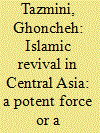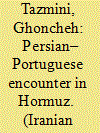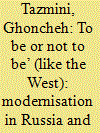|
|
|
Sort Order |
|
|
|
Items / Page
|
|
|
|
|
|
|
| Srl | Item |
| 1 |
ID:
019664


|
|
|
|
|
| Publication |
2001.
|
| Description |
63-84
|
|
|
|
|
|
|
|
|
|
|
|
|
|
|
|
| 2 |
ID:
190335


|
|
|
|
|
| Summary/Abstract |
Iranian and Russian intellectual traditions reveal a similar discursive genealogy in relation to Western modernity. Differing in social context, historical periodization, goals, methods and scope of inquiry, Iranian and Russian political debate reflects fascinating parallels, some of which prevail today. The debate over orientation reflects contemporary Iran and Russia’s deep-rooted ambivalence towards Western norms and institutions. This study delves deeper into this dilemma by revealing that both countries are heirs to a similar intellectual heritage that casts the West in a binary: as either a model or as an anti-model. In the case of Iran, this took form in the ‘Westoxication’ narrative that developed as a counter-discourse to the early twentieth-century debate that drew on Western liberal principles, and in the case of Russia, it manifested in the Slavophile-Westernizer controversy. Both intellectual debates were embedded in a complex exercise of self-reflection, with psychological, historiographic and religio-cultural dimensions that ultimately revealed a pattern that illuminates the contemporary dilemma that persists in both countries.
|
|
|
|
|
|
|
|
|
|
|
|
|
|
|
|
| 3 |
ID:
151804


|
|
|
|
|
| Summary/Abstract |
In 2015, the quincentennial commemoration of the Portuguese arrival on the island of Hormuz in the Persian Gulf (1515–1622) revealed the underlying presupposition among Iranians that the Portuguese presence on the island was the harbinger of a long-term pattern of western imperialism. This analysis questions the accuracy of this narrative by advancing a new interpretative framework that does not reduce the holding of Hormuz to simply another dark episode of European colonial history. Circumscribed and limited in aim and reach, Lusitanian activities on Hormuz cannot be brought under the generic rubric of “orientalism,” which is embedded in European colonial tradition, and which, by extension, buttresses Iranian nationalist sentiment about the Persian–Portuguese entanglement. This research demonstrates that Portuguese objectives diverged from the eighteenth and nineteenth century rationalist scientific traditions of the British, French and Germans professing a civilizing mission as a rationale for colonial policies. Whereas the Portuguese operated from a worldview that combined profit, dynastic pride and religious rhetoric, the Portuguese mission to Hormuz was not guided by a grand discourse of civilizing the “other.” While there was a complex interplay of commercial interests and brutal methods on this strategic entrepôt, Portuguese ambitions in Hormuz were confined and elusive, and at best a matter of tribute-taking. The present paper charters some of these complex interactions.
|
|
|
|
|
|
|
|
|
|
|
|
|
|
|
|
| 4 |
ID:
163079


|
|
|
|
|
| Summary/Abstract |
Having passed through a labyrinth of social contradictions, both Russia and Iran have reached a point on their historical timelines where they have transcended the logic of development of the eighteenth, nineteenth and twentieth centuries. Today, Russian and Iranian modernisation reflects the interaction of universal norms and practices and specific cultural traditions. As an epistemological category, modernity can no longer be enchained in the grip of a totalising narrative. Modernity has given rise to civilisational patterns that share some core characteristics, but which unfold differently. The Russian and Iranian historical experiences reveal the need to take a much broader view of the modernisation process by placing it in the context of cultural adaptation of civilisational particularities to the challenge of modernity. The era of fixed, Euro-centric and non-reflexive modernity has reached its end, and we have, in practical terms, the emergence of ‘multiple modernities’.
|
|
|
|
|
|
|
|
|
|
|
|
|
|
|
|
|
|
|
|
|